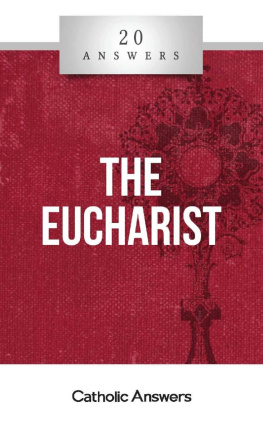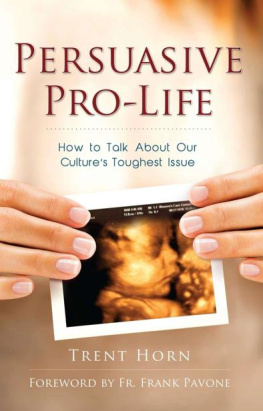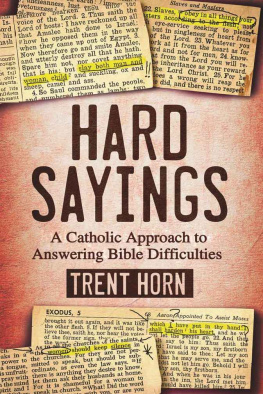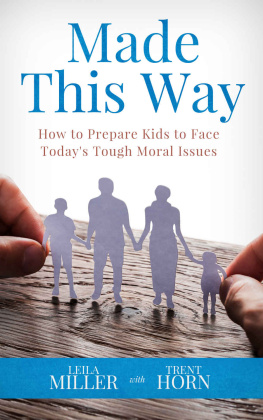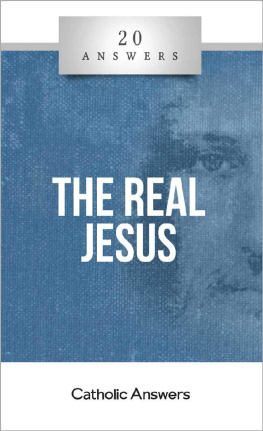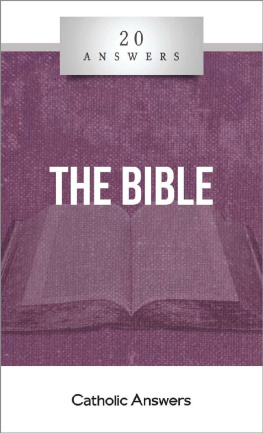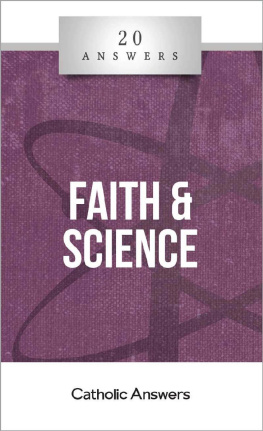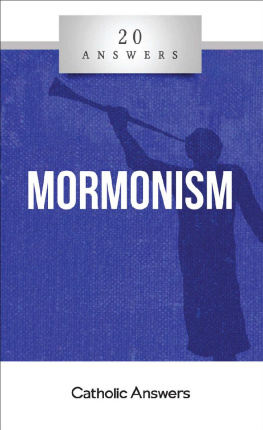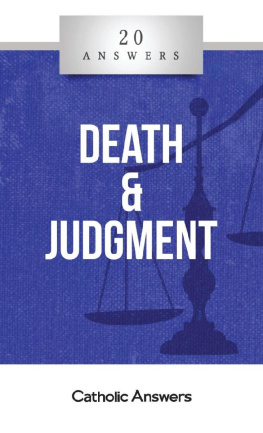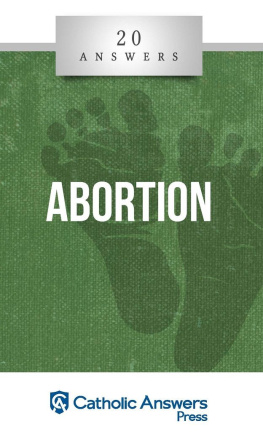Trent Horn - 20 Answers - Eucharist (20 Answers Series from Catholic Answers Book 11)
Here you can read online Trent Horn - 20 Answers - Eucharist (20 Answers Series from Catholic Answers Book 11) full text of the book (entire story) in english for free. Download pdf and epub, get meaning, cover and reviews about this ebook. year: 2017, publisher: Catholic Answers Press, genre: Religion. Description of the work, (preface) as well as reviews are available. Best literature library LitArk.com created for fans of good reading and offers a wide selection of genres:
Romance novel
Science fiction
Adventure
Detective
Science
History
Home and family
Prose
Art
Politics
Computer
Non-fiction
Religion
Business
Children
Humor
Choose a favorite category and find really read worthwhile books. Enjoy immersion in the world of imagination, feel the emotions of the characters or learn something new for yourself, make an fascinating discovery.
- Book:20 Answers - Eucharist (20 Answers Series from Catholic Answers Book 11)
- Author:
- Publisher:Catholic Answers Press
- Genre:
- Year:2017
- Rating:3 / 5
- Favourites:Add to favourites
- Your mark:
- 60
- 1
- 2
- 3
- 4
- 5
20 Answers - Eucharist (20 Answers Series from Catholic Answers Book 11): summary, description and annotation
We offer to read an annotation, description, summary or preface (depends on what the author of the book "20 Answers - Eucharist (20 Answers Series from Catholic Answers Book 11)" wrote himself). If you haven't found the necessary information about the book — write in the comments, we will try to find it.
20 Answers - Eucharist (20 Answers Series from Catholic Answers Book 11) — read online for free the complete book (whole text) full work
Below is the text of the book, divided by pages. System saving the place of the last page read, allows you to conveniently read the book "20 Answers - Eucharist (20 Answers Series from Catholic Answers Book 11)" online for free, without having to search again every time where you left off. Put a bookmark, and you can go to the page where you finished reading at any time.
Font size:
Interval:
Bookmark:
20 Answers
The Eucharist
Trent Horn

20 Answers: The Eucharist
Trent Horn
2015 Catholic Answers
All rights reserved. Except for quotations, no part of this book may be reproduced or transmitted in any form or by any means, electronic or mechanical, including photocopying, recording, uploading to the Internet, or by any information storage and retrieval system, without written permission from the publisher.
Published by Catholic Answers, Inc.
2020 Gillespie Way
El Cajon, California 92020
1-888-291-8000 orders
619-387-0042 fax
catholic.com
Printed in the United States of America
978-1-941663-43-1
978-1-941663-44-8 Kindle
978-1-941663-45-5 ePub
Table of Contents
Introduction
According to the Catechism of the Catholic Church (CCC), the Eucharist is uniquely important for Christians; it is the source and summit of the Christian life (1324).Even some of the Churchs harshest critics also understand the centrality of this doctrine. Former priest Bart Brewer writes, Of all the ancient dogmas of the Roman Catholic religion, the dogma of transubstantiation is the most wicked and satanic. It is the very heart of Romanism and the key to the so-called sacrifice of the mass.Atheists find the doctrine of the Eucharist to be especially revolting. In a debate about God and morality, atheist author Sam Harris said:
This to me is the true horror of religion. It allows perfectly decent and sane people to believe by the billions, what only lunatics could believe on their own. If you wake up tomorrow morning thinking that saying a few Latin words over your pancakes is gonna turn them into the body of Elvis Presley, ok, you have lost your mind. But if you think more or less the same thing about a cracker and the body of Jesus, youre just a Catholic.Its not just outspoken atheists or critics of the Church who deny the Real Presence of Christ in the Eucharist. According to one poll, although 91 percent of people who attend Mass weekly say they believe Christ is really present in the Eucharist, only 65 percent of those who attend Mass monthly believe the same thing. In fact, of those who attend Mass a few times during the year, fewer than half believe Christ is truly present in the Eucharist.
Of course, this should be expected, because if a person does not think Christ is truly present in the Eucharist then he will be less motivated to make time each week to receive him in it. Thus the goal of this booklet is to help Catholics and non-Catholics better understand the Eucharist so they can draw closer to Christ through this sacrament.
1. What does the Catholic Church teach about the Eucharist?
The word Eucharist comes from the Greek word eucharistein , which means thanksgiving. It is the memorial sacrifice of Christs body and blood, presented under the form of bread and wine, which is offered to the Father for the forgiveness of sins. After this offering, the Eucharist is consumed, and through this act it transmits sanctifying grace to those who are properly prepared to receive the body and blood of Christ (see Answer 12).
Like baptism or confession, the Eucharist is a sacramentan outward expression of an inward reception of grace.The Catechism teaches that The Eucharist is the efficacious sign and sublime cause of that communion in the divine life and that unity of the People of God by which the Church is kept in being (CCC 1325).However, the Eucharist differs from the other sacraments in an important way because itis the source and summit of the Christian life. The other sacraments, and indeed all ecclesiastical ministries and works of the apostolate, are bound up with the Eucharist and are oriented toward it (CCC 1324).
For example, the sacrament of baptism and initiates us into the Church so that we may receive the Eucharist. The sacrament of reconciliation spiritually heals us so we can receive the Eucharist after receiving absolution for our sins. The anointing of the sick physically and spiritually heals us so we can receive the Eucharist anew, and sometimes it is accompanied by the last Eucharist we will receive before we depart this life (what is called viaticum , which literally means with you, on the way). Lastly, the sacrament of marriage gives spouses the grace to raise families that partake of the Eucharist, and the sacrament of holy orders gives us the priests who offer up the Eucharist at Mass.
The Catechism goes on to say, For in the blessed Eucharist is contained the whole spiritual good of the Church, namely Christ himself, our Pasch (CCC 1324).The word pasch refers to the Jewish celebration of Passover, and it is no coincidence that the Eucharist commemorates the Passover meal Christ held with his disciples before his Crucifixion. But unlike the old Passover, the Eucharist is our new Passover and represents the sacrifice of the Lamb of God, who takes away the sins of the world (John 1:29). And just as the lamb of the old Passover was consumed, Christ, the new Passover lamb, must also be consumed. This is why the Eucharist is also called the Lords Supper or the Breaking of Bread. As the Catechism explains:
[It is called] the Lords Supper , because of its connection with the supper which the Lord took with his disciples on the eve of his Passion and because it anticipates the wedding feast of the Lamb in the heavenly Jerusalem. [It is called] the Breaking of Bread , because Jesus used this rite, part of a Jewish meal when as master of the table he blessed and distributed the bread, above all at the Last Supper. It is by this action that his disciples will recognize him after his Resurrection, and it is this expression that the first Christians will use to designate their Eucharistic assemblies; by doing so they signified that all who eat the one broken bread, Christ, enter into communion with him and form but one body in him (CCC 1329).Finally, this new Passover sacrifice is offered in the context of the Mass. It is called Mass because, the liturgy in which the mystery of salvation is accomplished concludes with the sending forth ( missio ) of the faithful, so that they may fulfill Gods will in their daily lives (CCC 1332).Within that context the Eucharist is also called the Holy Sacrifice, because it makes present the one sacrifice of Christ the Savior and includes the Churchs offering. The terms holy sacrifice of the Mass, sacrifice of praise, spiritual sacrifice, and pure and holy sacrifice are also used to describe the Eucharist, since it completes and surpasses all the sacrifices of the Old Covenant (CCC 1330).
2. How do non-Catholic views of the Eucharist differ from the Catholic belief?
Nearly all Christians celebrate some form of the Eucharist by consuming bread and wine in memory of Christs death and Resurrection. Protestants usually refer to the Eucharist as the Lords Supper and do not believe that Christ is physically present in the bread and wine at their services or at the Catholic Mass. The various Protestant views on this sacrament can be found along this continuum:
Rejection of the sacrament: Some denominations do not celebrate the Eucharist. For example, the Salvation Army is usually known for its charity work, but it is actually a self-proclaimed Christian denomination.
A memorial dinner: This view is common among Baptists and other born-again Christians. According to one Baptist writer, the Supper functions as proclamation, the presence of Christ in the indwelling Spirit not only assures forgiveness through the Word; he also convicts of unbiblical patterns of life and thought.According to this view, the Eucharist is a sign that points us to Christ, but Christ is not present in the Eucharist. Instead, Christ is present in the indwelling Spirit of the believer who receives the Eucharist.
Next pageFont size:
Interval:
Bookmark:
Similar books «20 Answers - Eucharist (20 Answers Series from Catholic Answers Book 11)»
Look at similar books to 20 Answers - Eucharist (20 Answers Series from Catholic Answers Book 11). We have selected literature similar in name and meaning in the hope of providing readers with more options to find new, interesting, not yet read works.
Discussion, reviews of the book 20 Answers - Eucharist (20 Answers Series from Catholic Answers Book 11) and just readers' own opinions. Leave your comments, write what you think about the work, its meaning or the main characters. Specify what exactly you liked and what you didn't like, and why you think so.

